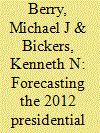| Srl | Item |
| 1 |
ID:
120909


|
|
|
|
|
| Publication |
2013.
|
| Summary/Abstract |
In 1999, the year before Ghana's 2000 election, the country experienced a large, unexpected decline in aid. The incumbent National Democratic Congress (NDC) lost the election. Did the decline in aid hurt the NDC at the polls, or was it simply incidental? Using data from a national, World Bank-funded electrification project, this article shows that the NDC was able to allocate aid according to explicitly political criteria. The article also exploits a quasi-experiment in aid disbursements to show that electrification caused NDC voting to increase in the constituencies that received electrification. Pre-electoral aid fluctuations exert a modest but measurable force on voting patterns. These findings add weight to calls for donors to coordinate to reduce aid volatility. They also show that incumbent governments can allocate aid strategically to secure votes, even under the best-case scenario of strict donor monitoring in an established democracy.
|
|
|
|
|
|
|
|
|
|
|
|
|
|
|
|
| 2 |
ID:
116466


|
|
|
|
|
| Publication |
2012.
|
| Summary/Abstract |
Nearly all forecast models of US presidential elections provide estimates of the national two-party vote (Campbell 2008). Each of the nine forecasts published in the 2008 forecasting issue of PS: Political Science and Politics made national popular vote total predictions for the major party candidates, while only one provided an expected result in the Electoral College (Klarner 2008). These national vote models are assumed to be reliable forecasts of who is likely to win the general election. In most cases, this assumption is reasonable. It becomes problematic, however, at precisely the point that forecasts are most interesting: when elections are close. In tight elections, national forecasts can and have produced a "winner" different from the actual winner. Consider the forecasts and ultimate outcome of the 2000 election. Each of the 2000 presidential election forecasts predicted vice president Al Gore to win a majority of the two-party popular vote, which he did, but none correctly predicted governor George W. Bush to assume the presidency (Campbell 2001). Never in US history have White House residents been determined through a national popular vote. Presidential elections are decided through contests in the states and the District of Columbia. The forecast model we developed explicitly models the presidential contest based on factors inherent to these 51 jurisdictions. This modeling approach allows us to make a projection of the Electoral College result, which popular vote estimates cannot.
|
|
|
|
|
|
|
|
|
|
|
|
|
|
|
|